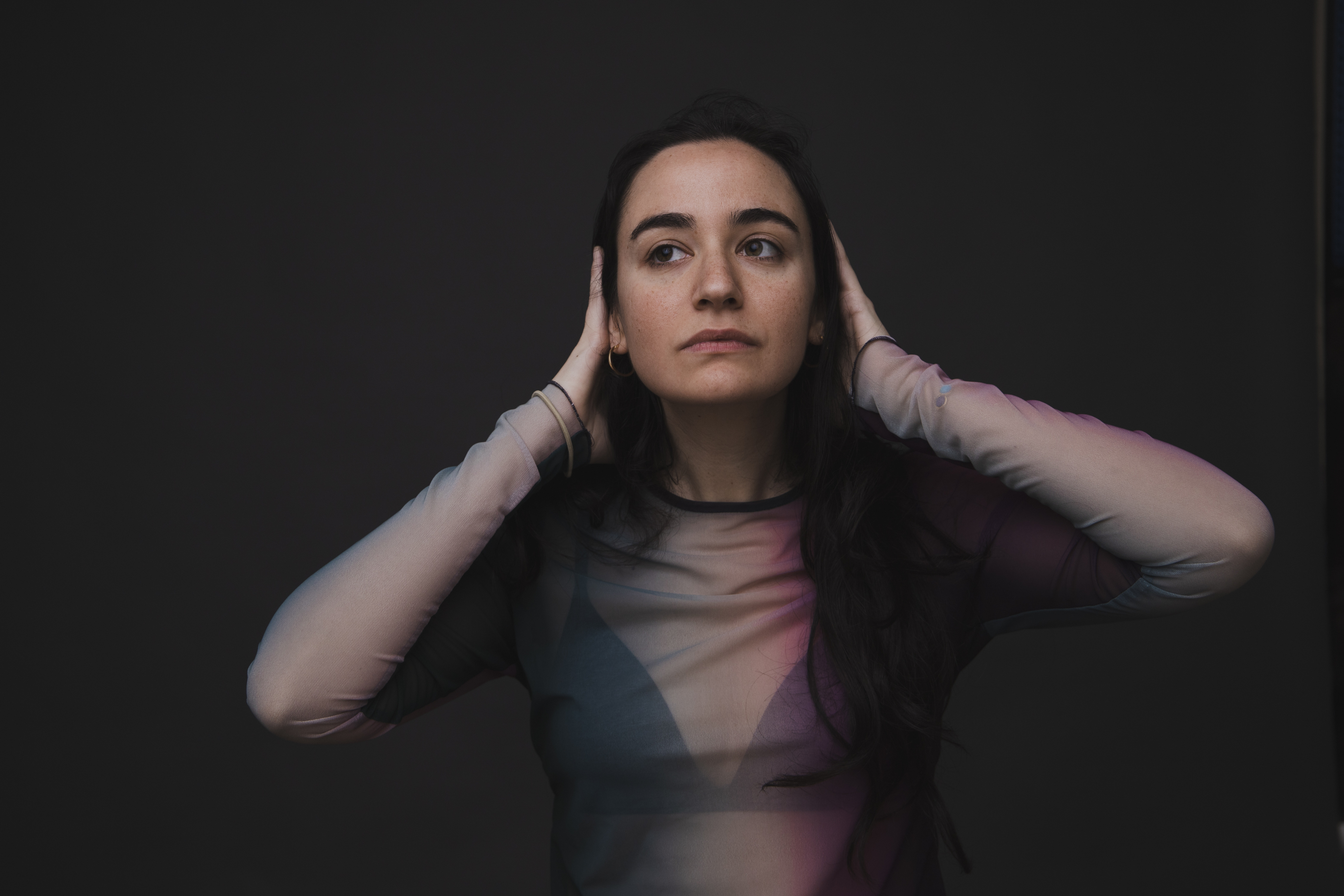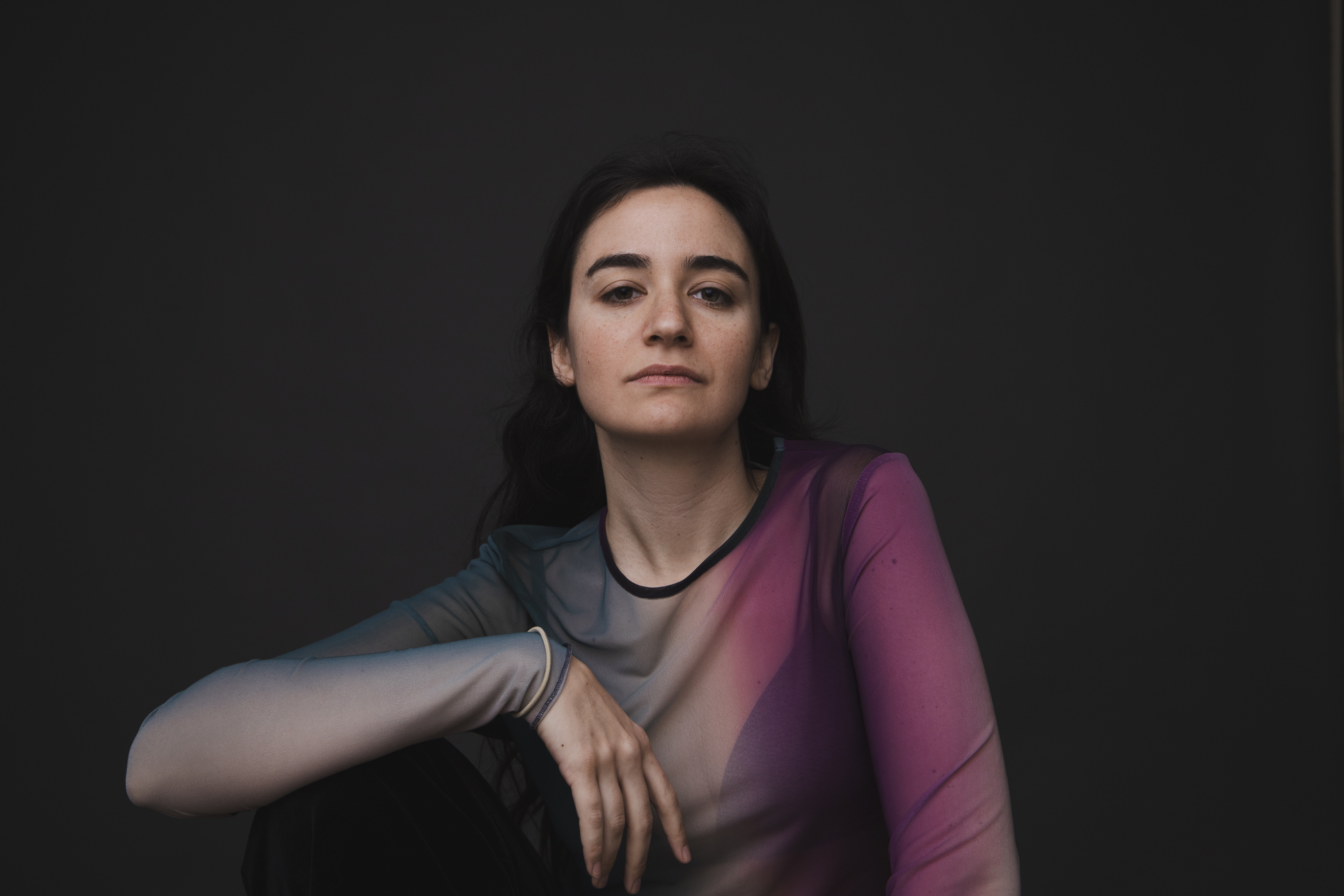 The first solo album by Lebanese singer, musician and architect Mayssa Jallad, who previously appeared with the band Safar and in several other constellations, was released at the beginning of the year. “Marjaa: The Battle of the Hotels” tells the story of the Hotel District in the centre of Beirut in melancholic folk songs and also in tattered eruptions. At the beginning of the Lebanese civil war, the Hotel District became the scene and at the same time a prominent actor of essential fighting – a story that goes back to the time long before the war and somehow continues in its aftermath until today. As a resident of the city and at the same time an architect, the musician has woven countless facets into her texts over a period of five years, which are written from the perspective of the buildings. Pointing out the interconnectedness of architecture, society, identity and war are as much a concern as creating an awareness also for the responsible wire-pullers of the events, but at the same time the album is a touching homage to a dissociated home full of ghostly places.. The following interview is about these things, but also about the cooperation with the many musicians who participated in her project.
The first solo album by Lebanese singer, musician and architect Mayssa Jallad, who previously appeared with the band Safar and in several other constellations, was released at the beginning of the year. “Marjaa: The Battle of the Hotels” tells the story of the Hotel District in the centre of Beirut in melancholic folk songs and also in tattered eruptions. At the beginning of the Lebanese civil war, the Hotel District became the scene and at the same time a prominent actor of essential fighting – a story that goes back to the time long before the war and somehow continues in its aftermath until today. As a resident of the city and at the same time an architect, the musician has woven countless facets into her texts over a period of five years, which are written from the perspective of the buildings. Pointing out the interconnectedness of architecture, society, identity and war are as much a concern as creating an awareness also for the responsible wire-pullers of the events, but at the same time the album is a touching homage to a dissociated home full of ghostly places.. The following interview is about these things, but also about the cooperation with the many musicians who participated in her project.
Besides being a musician and singer, you’ve also studied architecture and work in various parts of this field. In your album “Marjaa” you combine these two creative fields to a unity. Did you always see music and architecture as somehow interconnected, or is this the result of a more recent development?
Throughout my years studying architecture at the American University of Beirut (AUB), I loved designing theaters and spaces for performance and often plugged them into abandoned buildings in Beirut, as a way of making them accessible to the public. But then I entered the world of architectural firms, and being able to create my own designs became unrealistic. The hierarchy and practicality of architectural practice made it difficult for me to have a voice.
On the other hand, making music about architecture occurred to me only later, and at a very pivotal moment of my life. While I was in grad school in NYC, I had written a thesis about Beirut’s Battle of the Hotels, and it had meant a huge deal for me to delve into this difficult and significant history. After grad school, I worked at an architecture office in Manhattan and had to look away from Beirut and the research. The rigid 9 to 5 made it very difficult for me to make music, and this realization depressed me. That’s when I decided to return to Beirut and make music about the architecture of my city, uncovering difficult layers of the past through music. It changed my life.
Can you give us an overview about your music background? What were your initial activities and the major landmarks in your career as a singer?
My parents signed me up for piano lessons from a very young age and I learned with several teachers until I was about 16. Then I learned guitar with a friend of the family and began to write and sing around the same time. I sang at summer camp, the school concerts, the university classical choir, I was in a blues band for a while, even an a-capella group.
In 2010, I wrote a jingle that landed me a spot at a street festival in Beirut, on a big stage that closed the whole road. My friend Elie Abdelnour played guitar with me that night, and we started playing covers in small pubs around the city. A few years later we entered an open mic competition called Beirut Open Stage (BOS) and won. We started the band Safar and met producer Fadi Tabbal thanks to BOS, and that’s when we started working on our first EP “23 Kilograms”. This was 2014. We performed in about every venue in Beirut, even a couple of places in Europe and the States, and wrote 4 EPs together, the last couple at a distance since Elie and I had already moved to the US for grad school.
Then, in 2018, I decided to return to Beirut to start the experimental solo project that is Marjaa… which took 5 years of work! In the meantime, I participated in the protests of the October 17 2019 revolution and became part of a group that wrote protest songs. I also released a couple of songs in the summer of 2021 while I was part of the OneBeat fellowship in Beirut: “Madina Min Baeed” with Khaled Allaf and “Bi Kheir” and “Fil Aatma” with supergroup Baada Ab.
I experienced Beirut as a very diverse city and what struck me, among other things, was the often strong architectural heterogeneity, sometimes even in a small space, and I assumed that this had something to do with the different cultural influences in the modern age as well as with the civil war. In this respect, did Beirut contribute a lot to your decision to study architecture?
I think the diversity of the architecture in Beirut comes from a historic and political impossibility of urban planning and preservation. The city has been constantly changing, disappearing and growing since its very beginning. Contradictions are embedded in its people, neighborhoods and architecture. Growing up, I felt that the city had witnessed a violence that nobody wanted to mention. Large real estate was swallowing up entire communities and erasing meaningful places. Going to architecture school in Beirut was precisely to uncover this history and to better understand my city, and how the past caused it to suffer in the present.
In your new album you deal with a series of historic events during the Lebanese Civil War known as the Battle of the Hotels, a subject you also wrote your academic thesis about. What was it that struck and touched you so much about the topic?
It first started in architecture school at the American University of Beirut (AUB). I was interested in the modernist buildings of Beirut that had a history related to the civil war. I associated them with members of my family, and felt they needed my help. I wanted to uncover their history, their ailments, and design within them something new that would help them survive Beirut today.
In grad school, I wanted to focus on the Holiday Inn, a massive abandoned hotel I had done a studio on at the AUB. When I told my thesis advisor that the hotel had “participated” in the battle of the Hotels, he was intrigued. It made me realize that we took for granted an urban phenomenon that was not only significant locally, but that had a global impact: it was the first time ever skyscrapers were used in urban warfare.
When you recorded the album, which ideas came first – the narrative of the content or your ideas about the music? Or did both come together relatively at the same time?
For part A (Tracks 1 to 4), I kind of wrote the lyrics and the basic acoustic guitar interdependently, since the idea of walking with an old map came from my thesis research on the area of the hotels, laying over all the maps and being in shock at how much the city had changed. Youmna Saba helped me with the vocal melody and brought in her own voice and Oud to the mix. Then Fadi Tabbal thought of Marwan Tohme’s guitar layers and drones.
After we recorded Part A, I asked Fadi what he thought we should do next, and that’s when he said: “You’re gonna write the battle now, no?” So I embarked on the challenge of translating my thesis into lyrics, then writing the guitar chords that went with them. Except for “Markaz Azraq (December 6)”, which was a song I had written independently before that, and whose lyrics I changed to describe the event at hand. After I wrote the entire Part B, Fadi listened to it and associated different sounds and textures with it, and we started experimenting with his electric guitar in the studio. We then brought in different musicians to collaborate, especially in some songs where we felt like removing ourselves: “Al Hisar”, which Farah Kaddour improvised, “Holiday Inn (March 21 to 29)” which Sary Moussa produced and wrote the music of entirely and “Al Irth”, which Yara Asmar improvised.
In the first songs of the album you get the perspective of a person walking through a city trying to follow a map from a time bygone. It’s like a melancholic contemplation about the nature of (brutal) historic changes and ways of no return.. How close is this to your own personal feelings of being at home in your city?
I think I feel this the most in the areas where I feel that buildings and streets in Beirut are empty of inhabitants. It’s like, all of this development, for who? Is it really progress when no one can enjoy it? Also, the more research I do on downtown Beirut, the more the scale of the destruction that happened during “reconstruction” becomes clear in my mind. What a horrible feeling it must be for the generations older than me who have witnessed their entire city disappear.
One of the lyrics also mentions ghosts. In what form do you think these ghosts are – metaphorically speaking? – felt in these very places?
Many people died at the bullets of snipers that hid in the towers of the Battle of the Hotels, namely the Murr Tower and the Holiday Inn. These were intentional killings of whoever was on “the other side”, many of whom were innocent bystanders. So many people’s lives have been upended and disrupted because of this decision to invade the city. Many residents were kidnapped at checkpoints, or killed in massacres such as the ones I describe in “Markaz Azraq” and “Holiday Inn (January to March)”. And later on, the green line that was created between east and west Beirut at the close of the battle of the hotels was such a dangerous space that it became empty of people and overcome with lush greenery, an abandoned strip of the city, for 15 years. These are the ghosts that still roam among us, since no justice was done about their killing.
In large parts of the album, you give the hotel buildings a voice of their own and make them the protagonists and narrators of the very historic events. What brought you to this idea?
Personifying buildings is a discovery I had in my last year in architecture at AUB. I realized that I had been associating different members of my family to different buildings I studied throughout my time in architecture school, and I proposed design ideas based on the different personas I associated with the buildings. Then, a few years later, when the idea of writing music about architecture came about, I wrote a song called “Madina Min Baeed”, in which I embody the city (you can check the lyrics in the music video description)… so I guess when the challenge of writing the battle of the hotels came up, the most instinctive tool was for me to write it from the point of view of the building, as a sort of weapon falling into different hands, forced to “color” itself depending on the invader.
How big was the input of ideas that the other musicians involved brought into the project?
The musicians I worked with had a huge impact on how the music of the album sounded. Fadi Tabbal is a co-writer, since he took my initial ideas that I wrote on acoustic guitar and started envisioning spatial qualities and sounds. Youmna Saba is a co-writer because I workshopped “Etel” and “Kharita” with her even before working with Fadi, and she brought in the idea of voice and melody as an expression of spatial quality, which really blew my mind. Sary Moussa is a co-author because he wrote the music of “Holiday Inn March 21 to 29” fully, only based on what tracks were before and after. Farah Kaddour and Yara Asmar improvised their pieces based on minimal prompts from Fadi and me. Pascal Semerdjian’s drums were also very intuitive, very much made of his brilliant sensibility. Marwan Tohme lent me his guitar skills, and he and Julia Sabra became the choir in “Markaz Azraq”.
All of the collaborators I know on the album have their own creative projects. Have you worked with any of them before? I assume you’ve known most of them for a while…
I’ve worked with Fadi and Postcards (Julia, Pascal and Marwan) with my previous band Safar. We’ve known each other for 10 years! Fadi produced Safar’s 4 EPs , performed with us on multiple occasions, and co-wrote a couple of songs with us too. Pascal played drums on Safar records, Julia recorded some backing vocals for us and Marwan performed with us in the last concert we did. We’re good friends and I love all their projects, whether Fadi’s solo work, the Bunny Tylers, Postcards, Sanam, or Fadi and Julia’s recent collaboration Snakeskin. I also met Youmna 10 years ago but this is the first time we worked together. I’m so grateful and admire her so much as a human and artist. I met Sary a few years ago and have always loved his work. Imbalance is a jewel! I met both Farah and Yara in 2021 during a music fellowship in Beirut called Onebeat. Farah and I are also working on a new performance together so it’s been great to get to know her wonderful spirit! Having all these talented musicians collaborate on my debut solo album was a blessing and a dream!
How has the feedback been in your city or country so far? Were there any special reactions? I just saw excerpts of a beautiful release concert..
Thank you! It’s been very good so far. I feel like people are ready to talk about this difficult history. The concerts have been very emotional moments, the silence and tension are so palpable. I really felt people wanted to listen, and understand the story. Younger people have come to me expressing their relief at finally hearing this history spoken about in the open. And older people have come to me relating their own personal stories about living the battle of the hotels. One person came up to me saying: “I always wondered why something like this wasn’t done before. You made it.”
What kind of discussion – in your home country, but also abroad – would you like to contribute to with your album and your ideas?
I’d like people to understand that those who once destroyed the city can never be trusted to “rebuild” it, no matter how hard they try to clear their image. Each militia turned political party’s entire raison d’etre is based on dividing people. How can we build a country based on their ideology? Let us imagine a world without them!
On a global scale, I think everyone relates to this phenomenon of urban warfare, in a way or another: whether seeing your city transform based on the financial gains of a very few, or witnessing urban warfare in cities worldwide, Beirut is a case study of the worst case scenario, in more ways than one.
You also work for PROCOL Lebanon, formerly named Relief Centre, who in their own description focus “on delivering inclusive and prosperous futures for communities impacted by mass displacement”. Do you see a strong connection between your historic research (including the album concept) and these present activities?
I wrote Marjaa: the Battle of the Hotels based on the thesis that I wrote in 2017. Perhaps Marjaa 2 will be based on the research I’ve conducted with PROCOL Lebanon since January 2019… time will tell.
So this project will see some other new facets in the future! Do you also think about completely new ideas?
Not having to choose between music and architecture has been an incredible experiment, and I’m so grateful to those who believe in it and help make it a reality. For me, this is only the beginning for Marjaa.
Interview: U.S.
Fotos © Ely Dagher
@ Ruptured | Bandcamp | Soundcloud | Instagram
